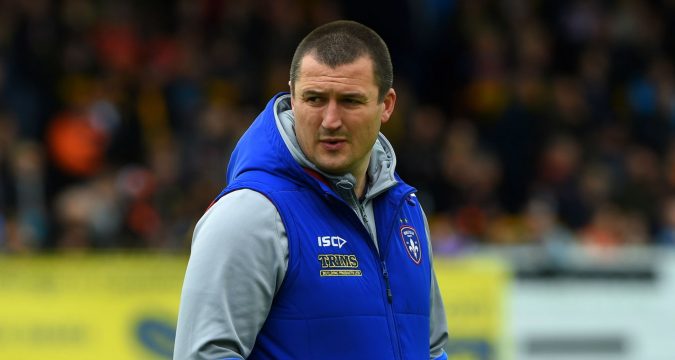
When awards season rolls around in a couple of months, we’re going to be more spoilt for choice than perhaps ever before.
Who will succeed Danny Houghton as the next Steve Prescott MBE Man of Steel, for example? Take your pick.. Luke Gale, Zak Hardaker, Robert Lui, Ben Murdoch-Masila, Matt Parcell, Adam Cuthbertson, Albert Kelly.. you could go on and on.
Young Player of the Year? Liam Marshall at Wigan, Jack Walker at Leeds.. there are more candidates than you can shake a stick at.
And the same applies to Coach of the Year. There are a number of candidates who would rightly be deserving of the accolade – including, obviously, Ian Watson and Daryl Powell (and yep, that’s me covering my back somewhat for what I’m about to say).
But Wakefield Trinity coach Chris Chester surely has to be among the leading candidates to take home the award this season.
The criteria for Coach of the Year is always somewhat guarded – and at a push, you’d be tempted to even say unknown. Is there actually any criteria? If not, there should be – and if there is, that’s why Chester has to be in with a chance.
First of all, you have to apply some context to the job he’s done at Wakefield (much like Watson at Salford). Brian Smith had just about kept Wakefield afloat in the Million Pound Game in 2015 but the start of 2016 was very Wakefield-esque by recent standards. Trinity had won just one of their first six games before Chester took charge last year – and with the same squad, he managed to get them into the top-eight.

Surely it was a fluke? Surely Wakefield couldn’t permanently change the way they’re perceived within the sport: as perennial strugglers?
Take a look at what Chester has done this year. On Sunday, Wakefield know that a victory, irrespective of what happens elsewhere in Super League, will confirm a top-four finish ahead of the split for the Super 8s. That sentence almost needs time to properly sink in: after 23 rounds, win on Sunday and Wakefield are a top-four side.
It’s an incredible turnaround for both Wakefield and the career of Chester. He was, rightly or wrongly, discarded by Hull Kingston Rovers just a handful of games into last season, and his stock was pretty low.
But Wakefield chairman Michael Carter took a punt on bringing Chester back to his hometown club – and since then, Trinity have only been going one way.
Chester has bought into the philosophy Wakefield pride themselves on when it comes to producing junior talent. Gone are the days where Wakefield’s best youngsters get cherry-picked elsewhere: and their first-team squad includes the likes of Max Jowitt, Tom Johnstone, James Batchelor and plenty of other talented homegrown players.
But Chester has recruited shrewdly too. Scott Grix has been a vital piece of the jigsaw at fullback, and off the field with what he brings in terms of experience. Craig Huby has done the same, as has Kyle Wood. Chester has got the best out of inherited talent like Matty Ashurst, Tinirau Arona and David Fifita – perhaps the one thing that truly does make a great coach above all else.
The appointment of John Kear to help Chester out has been a big factor in Trinity’s turnaround too, without question. But just as Ian Watson at Salford and Daryl Powell at Castleford have been lauded for the work they have done in 2017, the two frontrunners for Super League’s best coach now have a third party for company at the top.
The fact he’s yet another up-and-coming talented British coach, like Watson and Powell, only makes things even more satisfying.
